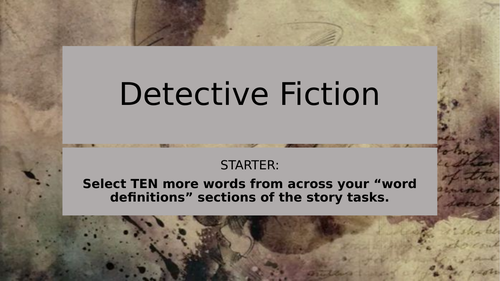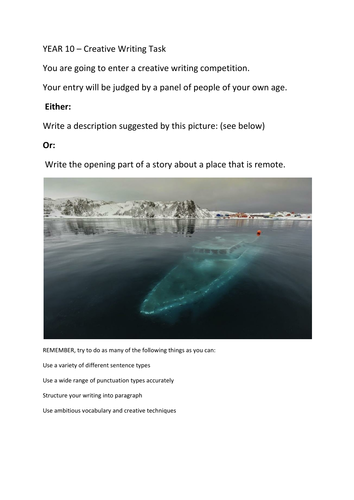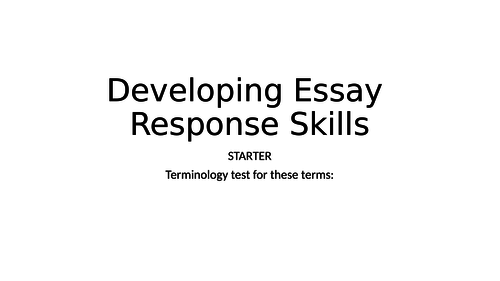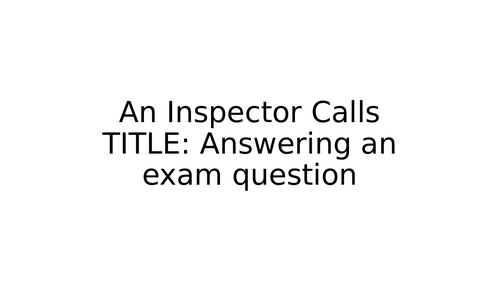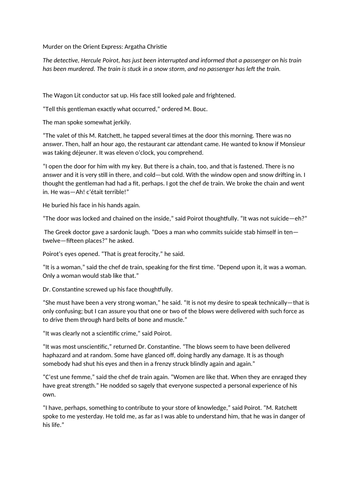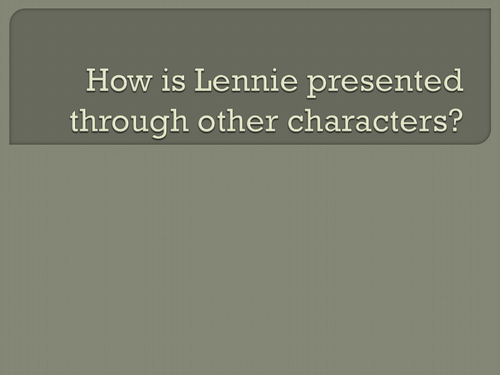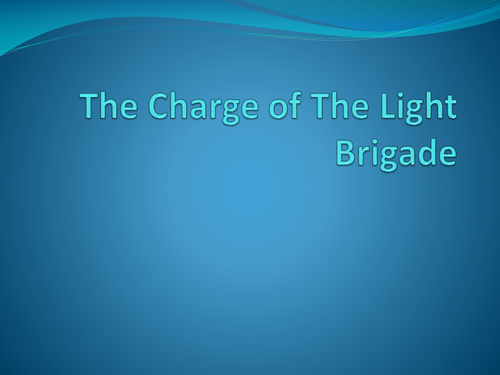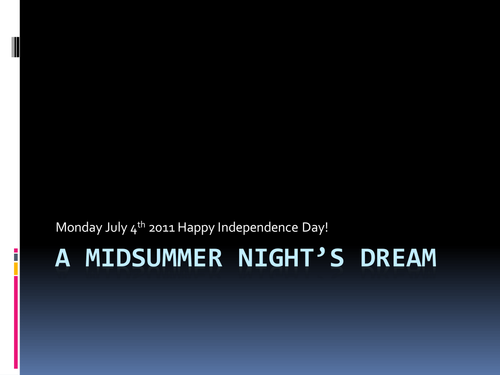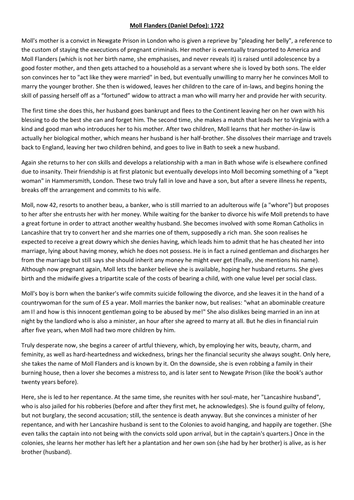
236Uploads
548k+Views
1361k+Downloads
All resources
Sale

KS3: Detective Fiction - Sherlock Holmes. Workbook included. Reading and Writing SoW.
A thoroughly enjoyable unit of work. Built around a work booklet and designed for that awkward half-term at the end of the year where you don’t want to give out new exercise books.
The workbook contains a copy of The Norwood Builder, comprehension questions and vocabulary list, as well as a variety of activities that focus (primarily) upon creative writing skills with some language and structure based tasks.
The lessons are designed to be used with the workbook.
NOTE: I may upload a slightly different workbook in the future, but I will leave the original on here.
Sale

AQA A-Level English Language and Literature: Othello - Lesson 3 (Desdemona)
My third lesson. This is designed to be a lesson where I as the teacher give less and the students give more of their own ideas - the group is reluctant to communicate. As a result, it is less "idea heavy" and far more task focused - you'll get a lot of markable material out of this.
Bundle Sale

Year 7 English Curriculum
A series of resources that make up a curriculum that can be taught to year 7.
Sale

AQA A-Level English Language and Literature: Othello - Lesson 4 (The Violence Within)
A thematic exploration of Violence within Othello - focusing specifically on Act 4. Also, the power point starts with a little revision of characters and quotations from across the play. I found this a fun lesson.
Sale

KS3: Introduction to Pre-1914 texts
A useful little unit that we put together to fill a 2/3 week gap. It has the students explore pre-1914 material - poetry and prose - and ends with a controlled assessment in the vein of the old AQA English style questions for the Literature paper.
Might fill some other gaps out there in shorter half terms.
Sale

AQA English Literature Poetry Knowledge Tracker Spreadsheet
A useful little tool. It allows you to RAGB(red, amber, green, blue) your students understanding/annotations of the 15 Power and Conflict poems in the AQA anthology. Also, it provides you with a poem by poem breakdown of your classes understanding/quality of annotations so you can see where the gaps are all the clearer.
The spreadsheet is set up for a class of up to 40, but the coding can easily be altered to allow for a whole year group.
Sale

AQA English Literature Data Collation Spreadsheet aka "The Machine"
Attached is a spreadsheet that does an awful lot of work for you. To summarise, it does the following:
Allows for easy collation of GCSE Literature marks on a paper by paper basis AND as a whole examination
Allows for easy identification of various student demagraphics - EAL, PP and so on
Allows you to measure progress against students best, average and last marks across both papers
Works out "how many marks" until you hit target grades for individual students
Colour codes grades and marks to allow for at a glance progress checks
Once you buy this spreadsheet, you will not need to get another LITERATURE spreadsheet. The document contains instructions as to how to update the spreadsheet.
Oh, and if you do get this, I suggest you LOCK the individual spreadsheets ASAP: the document is set up to allow you to do this and still enter the data, you just won't be able to accidentally delete any of the coding, thus removing any brain overloads that might ensue.
Happy spread-sheeting!
Sale

AQA GCSE English Language Paper 1 Style Creative Writing Tasks
Three quick and easy tasks with supporting images. Ideal for quick and easy filler lesson, or as building into a larger scheme.
Sale

AQA English Language Data Collation Spreadsheet aka "The Machine"
Attached is a spreadsheet that does an awful lot of work for you. To summarise, it does the following:
Allows for easy collation of GCSE Language marks on a paper by paper basis AND as a whole examination
Allows for easy identification of various student demagraphics - EAL, PP and so on
Allows you to measure progress against students best, average and last marks across both papers
Works out "how many marks" until you hit target grades for individual students
Colour codes grades and marks to allow for at a glance progress checks
Once you buy this spreadsheet, you will not need to get another LANGUAGE spreadsheet. The document contains instructions on the ARRAY tab as to how to update .
Oh, and if you do get this, I suggest you LOCK the individual spreadsheets ASAP: the document is set up to allow you to do this and still enter the data, you just won't be able to accidentally delete any of the coding, thus removing any brain overloads that might ensue.
I am using this at my current school and there are several other schools who are using this system with good reports.
Happy spread-sheeting!
PS - Yes, there is a page that reads exactly the same but for a version that caters for the AQA Literature course. The spreadsheets are different. Here's the link/address to the LITERATURE version:
https://www.tes.com/teaching-resource/aqa-english-literature-data-collation-spreadsheet-aka-the-machine-11405407
Sale

AQA English Language and Literature: Developing essay response skills to the Paris Anthology section
This is my attempt to engage and develop my Year 12s academic voices in their Paris Anthology related essay responses. The main issue my class had seemed to focus upon when and where to start. What I do is show them how they can place a particular emphasis on one of several potential areas of focus initially. I show them how they could use Mode, Audience, Purpose, each of Grice’s Maxims and each of the different levels of language as a starting point for an analytical response. The attached word document appears to be an “essay”.It isn’t. It’s the collected starting points placed in one document so that the students can focus more on the “how you do it” instead of trying to copy down the best bits.
It worked reasonably well and is suited for a class with similar needs. Hope you find this useful.
Bundle Sale

AQA English Language P1 and P2 Deconstruction Pack
A collection of resources that can be used to either go through specific English Language papers, or set up the students for a mock exam.
Sale

AQA English Literature: A Christmas Carol Method Focus Essay Builder
My year 11s were STILL struggling with how to frame a method, so I came up with this stand alone lesson. The idea is that, having reviewed the slide where the methods are explicitly identified, the students will see that a method and a quotation are not the same thing.
This was a successful lesson.
UPDATE: I repeated this process with a bottom set year 10 class where I was even more specific. This was also a successful lesson, so I’ve included it.
Sale

AQA English Literature: An Inspector Calls essay building lesson
A lesson that models the process of building a high-end An Inspector Calls essay. Please note, the lesson assumes that the class has read the play and has attempted versions of the AQA English Literature questions already. Also, the lesson works best as an aspirational example: I concentrate on using sophisticated language to shape my points, and focus on integrating appropriate references. Please note I’ve deliberately left some academic “gaps” too - this model response is a high-quality response, but there are other avenues of academic insight that can be taken.
Bottom line, to get the most out of this lesson, you’ll need to spend a little time going through it all first - hence the low price.
Sale

KS3: Survival Reading Assessment
A series of lessons and resources designed for a top set year 8 class. The extracts are a mixture of fiction and non-fiction. The focus was to take a group of year 8 students who are used to using the PEE structure and get them to write a concept focused response. I’ve included the model responses we built as a class, as well as the model response the students were provided.
Sale

KS3: Murder on The Orient Express Language Task - Method Focus
Using a format that proved successful in the KS4 arena, I’ve adapted the thinking to apply to an AQA English Language P1 Q2/P2 Q3 style task that would fit for a higher ability top set KS3 class.
The approach is to initially read the extract then to specifically identify concepts that relate to a language focused task, followed be explicitly identifying language based methods and incorporating into a response.
Sale

KS3: Born a Crime - Structure Focus
A lesson take from a collaborative scheme of work. The lesson focuses on the quite excellent Born A Crime by Trevor Noah. The focus is developing an initial understanding of South Africa, then Trevor Noah himself, before focusing in on the context surrounding the story itself.
After, the focus switches to analysing the structural choices made in the extract.
Additionally, I’ve included a useful little follow up lesson where the focus ins to build a piece of creative writing that follows a specific structural path.

KS4 GCSE Prose Of Mice and Men Pack
Contained within this pack is all the resources i used in my GTP year with a bottom set Year 10 GCSE group. I had mixed success bu i felt my teaching got stronger as i went through this unit. A starting point for those wondering where to start perhaps, or another way of looking at a topic thoroughly done.

KS4: Shakespeare and Conflict Poems: CONFLICT
Focused on the Shakespearean text vs the Conflict Poetry from the literary heritage. Very structured against the bands and pointed towards the controlled assessment.

Midsummers Nights Dream S&L Resource Kit
I did this as an end of year task with my Year 7's. Essentially it is putting on a puppet show of Pyramus and Thisbe, the idea being that the students tell a modern version but using elements of Shakespearean language. Set up for SLAF 3 but easy enough to alter for SLAF 1 and 2.

Neo-Classical prose, poem and play
A worksheet on a poem, play and piece of prose from the Neo-Classical era. The questions are to check understanding and encourage thoughtful study of the era.
I would appreciate feedback.

